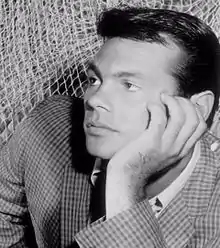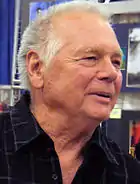Gary Lockwood
Gary Lockwood (born John Gary Yurosek;[1][2][3] February 21, 1937) is an American actor.[4] Lockwood is best known for his roles as astronaut Frank Poole in the film 2001: A Space Odyssey (1968),[5] and as Lieutenant Commander Gary Mitchell in the Star Trek second pilot episode "Where No Man Has Gone Before" (1966). He starred in the only American film by French New Wave director Jacques Demy, Model Shop. He played numerous guest television roles from the early 1960s into the mid 1990s, and played the title role in The Lieutenant (1963–1964).
Gary Lockwood | |
|---|---|
 Lockwood in 1962 | |
| Born | John Gary Yurosek February 21, 1937 Los Angeles, California, U.S. |
| Education | UCLA |
| Occupation | Actor |
| Years active | 1958–2004 |
| Height | 6 ft 2 in (1.88 m) |
| Spouses | |
| Children | 1 |
| Relatives | Mike Yurosek (uncle) |
| Website | gary-lockwood |
Early life
Lockwood was born in Van Nuys, Los Angeles, California as John Gary Yurosek[1][2] of partial Polish descent.[6] His uncle, Mike Yurosek, is credited with creating baby-cut carrots.[7] He was a one-year letterman for legendary Coach Red Sanders in 1956 and is listed as Gary Yurosek in official UCLA Athletics records. [8]
Career


Lockwood was a film stuntman, and a stand-in for Anthony Perkins prior to his acting début in 1959 in an uncredited bit role in Warlock.
Lockwood's two series came early in his career, and each lasted only a single season. ABC's Hawaii-set Follow the Sun (1961–62) cast him in support of Brett Halsey and Barry Coe, who played adventurous magazine writers based in Honolulu. Lockwood was Eric Jason, who did the legwork for their articles. He appeared in a supporting role in the film Splendor in the Grass (1961) and in ABC's TV series Bus Stop (1961). The 26-week series, which starred Marilyn Maxwell as the owner of a diner in fictitious Sunrise, Colorado, aired a half-hour after Follow the Sun.
He would star again with Weld in his film debut, Wild in the Country (1961), with Elvis Presley. Thereafter, Lockwood starred with Jeff Bridges in the acclaimed "My Daddy Can Beat Your Daddy" episode of The Lloyd Bridges Show. In 1959, he had an uncredited role as a police officer in the Perry Mason episode "The Case of the Romantic Rogue". In 1962, Lockwood again appeared on Perry Mason in the lead role in "The Case of the Playboy Pugilist". In 1963, Lockwood co-starred with Elvis Presley in the musical-comedy film It Happened at the World's Fair.
In 1963–64, Lockwood starred as a young U.S. Marine second lieutenant named William T. ("Bill") Rice in the NBC series The Lieutenant. This drama, about the peacetime Marines, was produced by the creators of Star Trek (Gene Roddenberry) and The Man from U.N.C.L.E. (Norman Felton). The series co-starred Robert Vaughn as Lieutenant Rice's immediate superior, Captain Raymond Rambridge. Despite moderately good reviews, The Lieutenant Saturday night time slot, opposite CBS' popular Jackie Gleason's American Scene Magazine, hastened its cancellation after 29 episodes.
In 1964, Lockwood guest-starred as Major Gus Denver in the first season of 12 O'Clock High, in episode 9, "Appointment at Liege", and again in 1965 in episode 29, "V For Vendetta". He also guest-starred as Lt. Josh McGraw in season 2, episode 4, "The Idolator" of 12 O'Clock High. Shortly afterward, Lockwood starred in another NBC television series The Kraft Mystery Theater (also known as Crisis) in an episode titled "Connery's Hands". He was cast opposite Sally Kellerman, with whom he would soon appear again as Helmsman Gary Mitchell in the second Star Trek pilot "Where No Man Has Gone Before" (1965) in which their characters developed malign super powers.
He may be best known on the big screen for his co-starring role in Stanley Kubrick's iconic 2001: A Space Odyssey (1968) as Dr. Frank Poole. Lockwood was the lead in Model Shop (1969), the American debut by French writer-director Jacques Demy. He starred with Elke Sommer in the crime drama They Came to Rob Las Vegas (1968) and with Jacqueline Bisset in the pro - women's lib comedy Stand Up and Be Counted (1972).
Lockwood co-starred with Stefanie Powers (then his wife) in an episode of ABC's Love, American Style as a newlywed who gets his mouth stuck around a doorknob. In 1983, he guest starred in the series Hart to Hart ("Emily by Hart") with Robert Wagner and Powers, by then his ex-wife. Between 1959 and 2004, Lockwood gained roles in some forty theatrical features and made-for-TV movies and eighty TV guest appearances, including the CBS 1975 family drama Three for the Road and Barnaby Jones starring Buddy Ebsen, in which he appeared many times as a villain.
Personal life
Lockwood has been married two times. His first marriage was in 1966 to actress Stefanie Powers. The couple divorced in 1972. In 1982, Lockwood married actress and businesswoman Denise DuBarry.[9] with whom he has a daughter Samantha Du Barry-Lockwood, who is an International Yoga teacher, actress, model, and business woman.
TV and filmography
- Onionhead (1958) as Sergeant Seated at Bar (uncredited)
- Bronco (1959, TV Series) as Johnny Evans (credited as Gary Yurosek)
- Warlock (1959) as Gang Member (uncredited)
- Perry Mason (1959-1962, TV Series) as Davey Carroll / Young Policeman
- Tall Story (1960) as Russian Basketball Player (uncredited)
- Wild in the Country (1961) as Cliff Macy
- Splendor in the Grass (1961) as Allen 'Toots' Tuttle
- Follow the Sun (1961-1962) as Eric Jason
- The Magic Sword (1962) as Sir George
- It Happened at the World's Fair (1963) as Danny Burke
- The Lieutenant (1963-1964, TV Series) as Lieutenant Rice
- Combat! (1964, TV Series) as Sgt. Meider
- Kitten with a Whip (1964) as Minor Role (uncredited)
- 12 O'Clock High (1964-1965, TV Series) as Maj. Gus Denver / Lt. Josh McGraw
- Star Trek: The Original Series (1966, TV Series) as Lt. Cmdr. Gary Mitchell
- Firecreek (1968) as Earl
- 2001: A Space Odyssey (1968) as Dr. Frank Poole
- They Came to Rob Las Vegas (1968) as Tony Ferris
- Model Shop (1969) as George Matthews
- R. P. M. (1970) as Rossiter
- Earth II (TV pilot) (1971, TV Movie) as David Seville
- Stand Up and Be Counted (1972) as Eliot Travis
- Barnaby Jones (1973–79) 6 episodes throughout series
- Night Gallery (1973, TV Series) as Jim Figg
- Mission Impossible (1973, TV Series) as Nicholas Varsi
- Banacek (1973, TV Series) as Owen Russell
- The Six Million Dollar Man "Eyewitness to Murder" (1974-1975, TV Series) as Hopper / John Hopper
- Cannon (1975) "Coffin Corner" as Richard Halsey
- Project Kill (1976) as Frank Lassiter
- The Quest (1976, TV Series, a short-lived NBC western) as Walter Lucas
- Walt Disney's Wonderful World of Color in 2-part episode, "Kit Carson and the Mountain Men" (1977, TV Series) as Bret Haskell
- Bad Georgia Road (1977) as Leroy Hastings
- The Bionic Woman (1977) as Lyle Cannon
- Police Story (1977, TV Series) "End of the Line" as J.A. "Red" Avery
- Starsky & Hutch (1978, TV Series) as Jimmy Spenser
- The Ghost of Flight 401 (1978, TV Movie) as Jordan Evanhower
- The Incredible Journey of Doctor Meg Laurel (1979, TV Movie) as Harley Moon
- Top of the Hill (1980, TV Movie) as Dave Cully
- Vega$ (1980, TV Series) as District Attorney Edward St. John
- Hart to Hart (1983, TV Series) as Alex Carmen
- Emergency Room (1983, TV Movie) as Dr. David Becker
- Survival Zone (1983) as Ben Faber
- Simon and Simon (1984-1986) as Dr. Maynard Ellis / Exec. Prod. Ron Redding / Daniel C. Thacker / Eddie Blair / Air Force Col. Christopher J. Ahern
- Murder, She Wrote (1985-1994) as Sam Mercer / Sheriff Deloy Hays / Tom Carpenter / Harris Talmadge
- The Wild Pair (1987) as Captain Kramer
- MacGyver (1988, TV Series) as Grant
- Terror in Paradise (1990) as Major Douglas
- Night of the Scarecrow (1995) as Mayor William Goodman
- A Bedfull of Foreigners (1998) as Dieter Dieterman
References
- Leslie Halliwell (September 1979). Halliwell's Teleguide. Granada. p. 179.
- Joseph F. Clarke (1977). Pseudonyms. BCA. p. 104.
- Illustrated Weekly of Pakistan. Pakistan Herald Publications. April 1963. p. 38.
- Hal Erickson (2013). "Gary Lockwood". Movies & TV Dept. The New York Times. Archived from the original on 2013-12-16.
- Adler, Renata (April 4, 1968). "2001 A Space Odyssey (1968) The Screen: '2001' Is Up, Up and Away:Kubrick's Odyssey in Space Begins Run". The New York Times.
- "Lewiston Evening Journal - Google News Archive Search". news.google.com. Retrieved May 5, 2018.
- "Wedding: Gary Lockwood (Yurosek) & Stefanie Powers". scvhistory.com. Retrieved 20 September 2016.
- UCLA 2021 Football Information Guide (scroll down to page 127). Retrieved August 2, 2022.
- Ephraim Katz, et al: The Macmillan International Film Encyclopedia, London: Macmillan, 1998 (Third Ed.), pg. 839; Adrian Room Dictionary of Pseudonyms: 13,000 Assumed Names and Their Origins, Jefferson, N.C.: McFarland, 2010, p. 292; John Walker (ed) Halliwell's Who's Who in the Movies, London: HarperCollins, 1999, p. 255